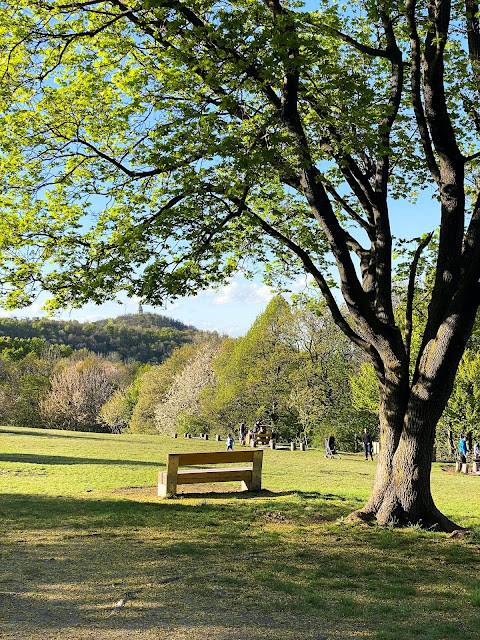 |
| Spring in the park by Noémi Macavei-Katócz |
I have notebooks and Word documents filled with potential research projects. One of these projects would study local ecological knowledge in cities. I haven't made much headway with this project. One reason is time. Another reason is funding. But I don't want the idea to stay in the dark so I am sharing my outline here.
Local Ecological Knowledge in Cities (U-LEK)
Traditional ecological knowledge or TEK is usually studied in non-urban settings. A formal definition of TEK is: “TEK refers specifically to all types of knowledge about the environment derived from experience and traditions of a particular group of people” (Houde 2007 quoting Usher 2000). A more contemporary formulation is local ecological knowledge or LEK defined as place-based ecological knowledge but like TEK, LEK studies are often conducted in non-urban settings. However, people in cities have deep knowledge about the ecology of urban green spaces. In addition to species identification, “local ecologists” in urban areas know what birds use a space, which species have been observed in different parts of a greenspace, when plants will bloom and in what order, what used to grow where, etc. I touched on grassroots ecological knowledge in my presentation to the Next Epoch Seed Library: Weedy Salon.
Literature about ecological knowledge includes:
- “Civic ecology” – community greening in cities in non-formal spaces (i.e. not a city park) where residents initiate, plan, and care for “socio-ecological systems”
- Existing research has focused on learning and knowledge used for action and advocacy
- Existing research has not explored explicitly what type of (nature) knowledge is learned, shared
- Pro-environment behavior and/or ecological literacy - this literature assumes that cities are biodiversity poor at least on the richness scale and that impacts people’s environmental knowledge, i.e. people know introduced species but not native species (see Parker 2009, Turner et al 2004) and that urbanization separates humans from nature
Other relevant literature are:
- Extinction of experience (Miller)
- The “pigeon paradox” (Dunn et al. via Parker 2009 MA thesis)
- The impact of outdoor experiences on environmental knowledge (McDaniel and Alley)
- Place attachment (Halpenny 2010)
My research questions are descriptive and exploratory in nature.
- Is there LEK in cities?
- How is knowledge acquired/pathways to knowledge acquisitions?
- Experiential
- Purposeful (I choose pathway X because it’s supposed to be the best way to learn A)
- Cultural (ex: seeking out and collecting ginkgo nuts)
- Solitary versus collective
- Why is knowledge developed?
- Environmentally curious
- Specific interest in plant or animal
- Access to greenspace or "patch"
- Knowledge for personal enjoyment
- Knowledge to share with others
- Part of professional work
- Spatial dynamics
- What role does proximity to public greenspace play (assuming most people don’t have private outdoor spaces)? For birders, what role does the presence of charismatic birds play?
- What is the size of the patch of interest?
- Is local ecological knowledge used for management/advocacy? When?
- Is knowledge transmitted? How?
- Birding, walkabout, and other similar activities with others and/or via spontaneous encounters
- Via blogs, social media
My proposed methodology includes the following methods:
- Qualitative, semi-structured interviews
- Participant observation
- Written records (blogs, social media, newspaper coverage, etc.)
Constructive feedback is welcome! I also have a list of potential interview participants. If you are interested in participating in this study and you live in NYC or in a transit-friendly part of NJ or CT, please reach out to me in the comments.
Comments
Post a Comment
Thank you for commenting on this post!